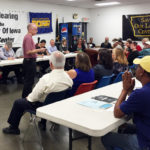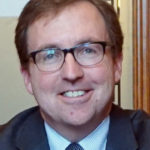In 1946, Pastor Martin Niemöller, who eventually became part of the Christian opposition to Hitler, acknowledged his early silence in the face of the Nazi Party’s violence:
When the Nazis came for the communists,
I remained silent;
I was not a communist.
When they locked up the social democrats,
I remained silent;
I was not a social democrat.
When they came for the trade unionists,
I did not speak out;
I was not a trade unionist.
When they came for the Jews,
I remained silent;
I wasn’t a Jew.
When they came for me,
there was no one left to speak out.
Imam Khalid Latif, a chaplain for the New York City police department and for New York University, commenting on the growing anti-Muslim rhetoric on the part of political candidates and others, laments that these voices
…give rise to and justify those who in the recent weeks have burned down and vandalized mosques all over this country. Who have pushed women wearing headscarves on to train tracks, shot cab drivers, and even in our own city validated for three young men their beating of a 6th grade Muslim girl in Harlem. As they punched her, beat her, tried to rip the scarf off her head, they called her ISIS over and over.
He concludes:
We do not have to be women to stand up for women’s rights, black to stand up for black rights, or Muslim to stand up for Muslim rights. “If you see something, say something” has to mean something different to us today. If you see bigotry, say something. If you see hatred, say something. If you see racism, say something. You and I have to be the change that this world needs. We can’t adopt a bitterness or passivity that lets people who have no interest other than their own self-interest succeed.
How quickly we forget that (almost) all of us are immigrants or children of immigrants, and that Catholics in this country have been subjected to the same type of abuse and ridicule, to the same kind of calls for exclusion, to the same kind of violence. So it is especially distressing to hear Catholics adopting this anti-Muslim rhetoric or, at the very least, remaining silent.
We have a short memory. How many of us know of Louisville, Kentucky’s “Bloody Monday” and other anti-Catholic violence carried out by the nativist Know-Nothing Party? How many of us realize that such anti-Catholic sentiment still smolders under the surface in parts of this country? I know. I spent over eight years in rural Kentucky and Tennessee: one of our churches was vandalized, another burned to the ground; Catholic students were ridiculed by public school teachers; Catholic employees were denied promotions; Catholics were demonized from pulpits on Sunday.
We have a short memory. It is disturbing to hear past injustices, such as the internment of Americans of Japanese descent during World War II, being used to justify present calls to deprive Muslims of their civil and human rights. The rise of far-right political parties and platforms raises the specter of those Pastor Niemöller opposed. Perhaps, in light of current events, we need to add a few more verses to his prophetic words in order to remind and challenge ourselves:
When they came for the Catholics,
I remained silent;
I wasn’t a Catholic.
When they came for the Japanese-Americans,
I remained silent;
I wasn’t Japanese.
When they came for the immigrants and refugees
I remained silent;
I was neither (and I forgot that, at one time, my family was).
When they came for the Muslims,
I remained silent;
I wasn’t a Muslim.
Who are “they?” We are. Whether we lend our support to these voices, or simply remain silent, we are “they.” We are the ones who push Muslim women onto tracks and beat up a 6th grade Muslim girl; we are the ones who shoot Muslim cabbies and burn down mosques. Even if we never lift a finger, fire a gun, or strike a match, their blood is on our hands.
Let me be clear: I am not calling anyone a “Nazi” and I in no way want to minimize the atrocities that occurred under their reign of terror. But today’s increasingly shrill rhetoric is worrisome; it is taking us in a dangerous direction, a direction contrary to the Gospel. Words are powerful and we cannot let such words go unanswered. As Imam Latif has challenged us, we have to do better.
Deacon Frank Agnoli
What does the Catholic Church teach about Islam?
The Catechism (#841) states: “The plan of salvation also includes those who acknowledge the Creator, in the first place amongst whom are the Muslims; these profess to hold the faith of Abraham, and together with us they adore the one, merciful God, mankind’s judge on the last day” (Lumen Gentium 16; see Nostra Aetate 3).
USCCB Resources: http://tinyurl.com/ovkkqqz
CCCB Statement: http://tinyurl.com/o2tzhya










